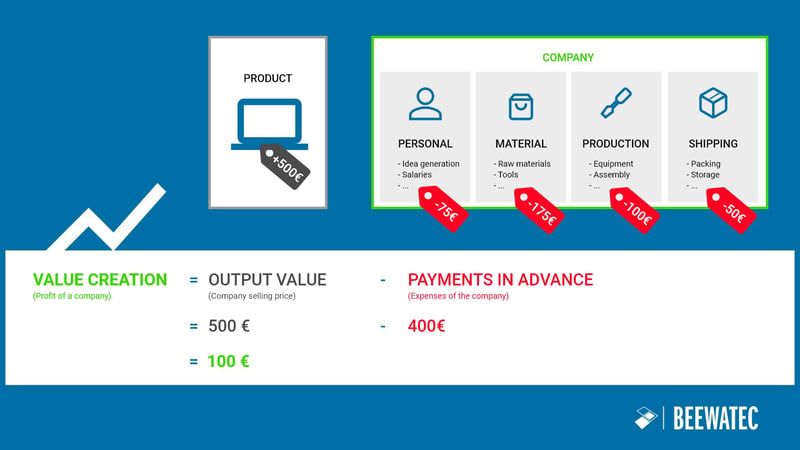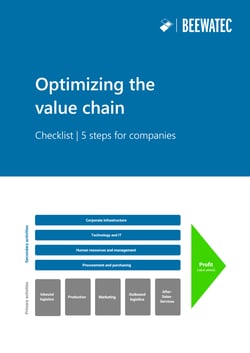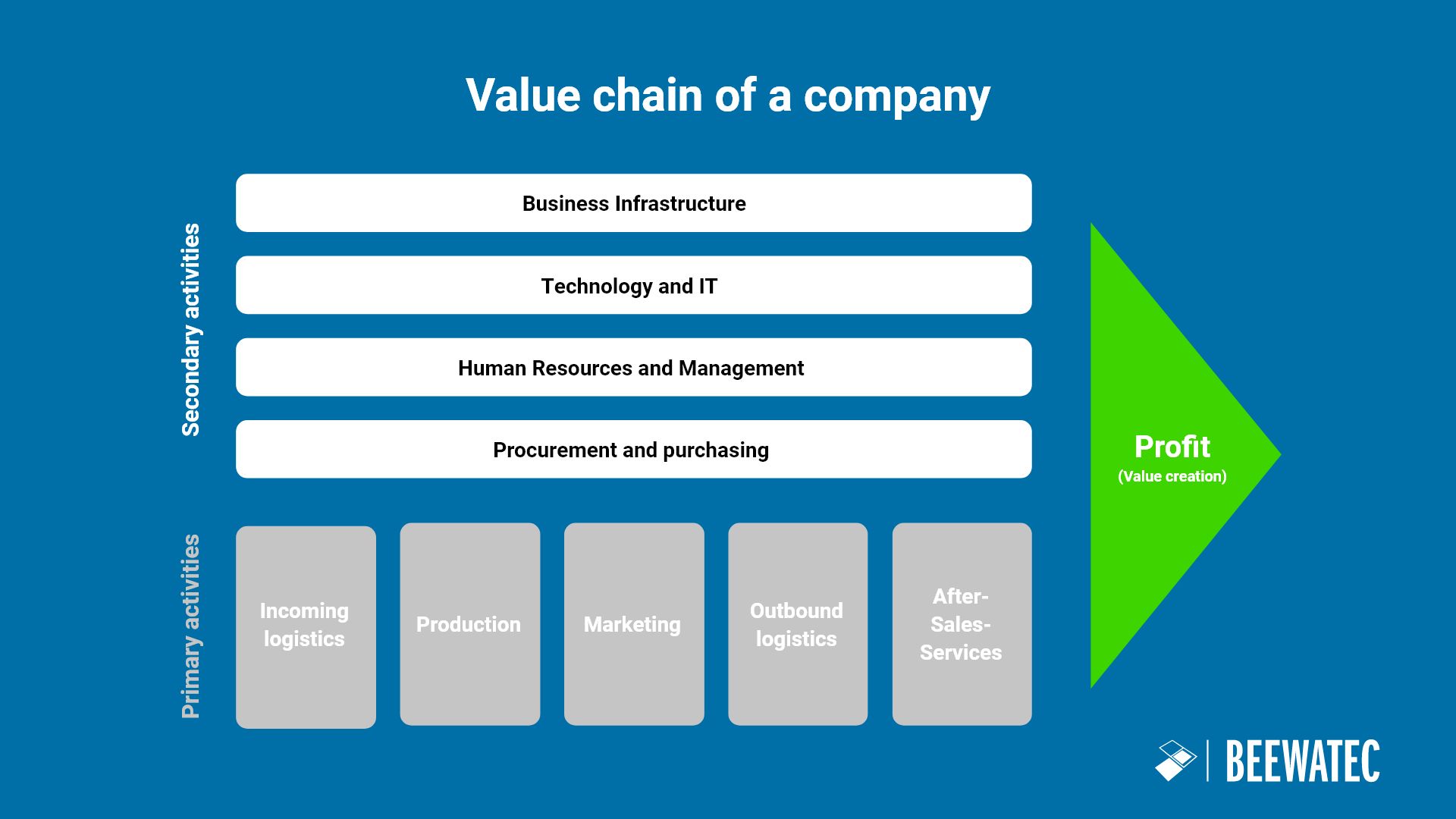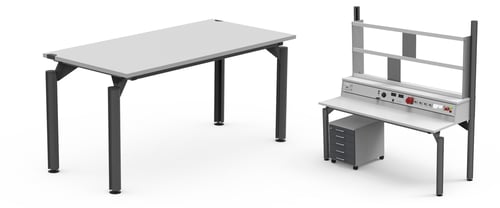7 min read
Value creation & value chain explained simply - definition and examples
![]() Jens Walter
:
29.September.2023
Jens Walter
:
29.September.2023
In today's globalised economy, value creation is a critical factor for companies to differentiate themselves from the competition and achieve long-term success. The ability to create and enhance value through different stages of the value chain is a fundamental principle that helps companies to be profitable and to develop.
In this blog article, we will take a closer look at the concept of value creation and what it means for businesses.
Content
- What is value creation (for businesses)?
- What is value creation (for national economy)?
- The importance of value creation
- Examples of value creation - how value is created
- Calculating value creation (gross and net value added)
- What is the value chain?
- Example of a value chain
- How BeeWaTec supports the value creation of companies
- Conclusion
What is value creation for businesses? (Definition)
Value creation is the performance of a company to produce products or services that have a higher value than the inputs used. In other words, it is about increasing the value and thus the selling price, and generating profit. To increase the value of a product, companies use raw materials, resources and information.
Value creation includes various activities along the value chain, starting from the procurement of raw materials to the delivery of the finished product to the customer.
Value creation is important because it shows how successfully a company operates and how well it manages its resources to generate profits. Higher value added often indicates better performance of the company.

What is value creation for national economy? (Definition)
The concept of value creation is also of importance in economics, as it indicates the economic performance of the country across all economic sectors and industries (= corresponds to the aggregated value creation of all related economic sectors / national accounts). The sum of the value added of all enterprises in an economy forms the gross domestic product (GDP), an important indicator of the economic health of a country.
In this paper, the focus will be on business value added, i.e. the value added by businesses.
The importance of value creation / value enhancement for higher overall performance
Creating value is essential for companies and the economy in general. Here are some reasons why value creation is of high importance:
1. Competitive advantage
- Companies that are able to create more value than their competitors can differentiate themselves and gain a competitive advantage. The market value of the company increases.
- By focusing on innovative solutions and customer value, they can gain market share and strengthen their position.
2. Profitability
- Efficient value creation enables companies to optimise their costs and improve their profit margins.
- Higher value creation can lead to a better return on investment (ROI) and long-term economic success.
3. Customer satisfaction
- Customers are willing to pay more for products or services if they receive added value and superior quality.
- High value creation helps to better meet customer needs and create a positive customer experience.

CHECKLIST
How to optimize the value chain
With our free checklist you have an overview of the steps for an efficient optimization of the value chain (for companies).
DOWNLOAD CHECKLISTCHECKLIST
How to optimize the value chain
With our free checklist you have an overview of the steps for an efficient optimization of the value chain (for companies).
Examples of value creation - this is how value is created
Value creation occurs when a company or organisation increases the value of a product or service through its economic activities or services. This usually happens at different stages of the production or service process, i.e. along the value chain. Here are some examples:
- Raw material procurement and production: In the initial phase, value creation can occur when raw materials or components are procured and transformed into a finished product. This process can be done through the work of employees, machines and technologies.
- Design and development: When a company develops innovative ideas, designs or technologies to improve or redesign a product or service, this contributes to value creation.
- Marketing and distribution: Marketing a product or service and placing it successfully in the market can increase its perceived value and thus contribute to value creation.
- Customer service and support: Good customer service and support can help increase customer satisfaction and add value to a product or service.
- Logistics and supply chain: An efficient supply chain and logistics can ensure that products reach customers on time and in good condition, contributing to value creation.
- Innovation: Through continuous research and development, companies can introduce new features, products or services that create more value for customers.
- Increasing efficiency: Optimising production processes and business operations can reduce costs and thus increase the value of a product or service.
Overall, value creation occurs at different stages of the economic life cycle of a product or service as companies use their resources and capabilities to increase value for their customers.

Calculation of value creation (gross value creation and net value creation)
The (gross) value creation is calculated from the difference between the production value and the intermediate inputs. It applies to both companies and the national economy.
Example of calculation of gross value creation and net value creation
Assumed data for the enterprise (manufacture of mobile phones):
- Turnover (total revenue from the sale of mobile phones): 1,000,000 euros.
- Cost of raw materials and components: 300,000 euros
- Wages and salaries of employees: 400,000 euros
- Operating costs (rent, electricity, insurance, etc.): 100,000 euros
- Depreciation (loss in value of plant and machinery): 50,000 euros
- Taxes and duties: 30,000 euros
Calculation of gross value creation:
Gross value creation is the value created by the enterprise through its economic activities, before all external costs are deducted.
- Gross value creation = production value (turnover) - intermediate consumption.
- Gross value creation = 1,000,000 euros - 300,000 euros
- Gross value creation = 700,000 euros
The gross value creation is 700,000 euros. This is the value the company has created by producing mobile phones before wages, operating costs, depreciation and taxes are taken into account.
Calculation of net value creation:
Net value creation is the amount left over after deducting all costs (including wages, operating costs, depreciation and taxes).
- Net value creation = gross value creation - wages and salaries - operating costs - depreciation - taxes.
- Net value creation = 700.000 Euro - 400.000 Euro - 100.000 Euro - 50.000 Euro - 30.000 Euro
- Net value creation = 120,000 euros
The net value creation is 120,000 Euros. This is the amount that the enterprise has earned as profit after deducting all costs. It is the amount available to make investments, pay off debts or be distributed as profits to the owners.
What is the value chain?
The value chain is a simple way of describing the different steps or activities that a company goes through to produce a product or service and bring it to market. Each of these steps contributes to the incremental value of the final product.

Here is a simple explanation:
- Procurement of raw materials or resources: this is the first step where a company procures the necessary materials, raw materials or resources to make its product or provide its service.
- Manufacturing or production: In this step, the raw materials or resources are transformed into the actual product. This may involve the use of machinery, labour and technology.
- Processing or finishing: Here, further steps may be taken to improve the product, such as refinement, quality control or adaptation to specific requirements.
- Distribution and marketing: After production, the product or service is brought to market. This includes advertising the product, placing it in shops or online to reach customers.
- Sales and customer support: When customers buy the product, the sale is made. At the same time, the company may provide customer service or support to ensure customer satisfaction.
- Logistics and delivery: The products need to be transported from the manufacturer to the points of sale or to the customer. Here, logistics play an important role in ensuring that products arrive on time and in good condition.
- Customer experience and feedback: After the purchase, the company often collects feedback from customers to improve the product or service and optimise the customer experience.
The value chain shows how each company carries out a series of activities to incrementally increase the value of a product or service before bringing it to market. This concept helps companies to analyse and optimise their processes to be more competitive and provide more value to customers.
Example of a value chain in the food industry
Here is a simple example of a value chain in the food industry, starting with the production of chocolate bars:
- Procurement of raw materials: The company buys cocoa, sugar, milk powder and other ingredients from farmers and suppliers.
- Manufacturing: In the production plant, the raw materials are mixed, melted, moulded and processed into chocolate bars.
- Processing or further processing: The chocolate bars are checked for quality, packaged and labelled.
- Distribution and marketing: The chocolate bars are marketed in supermarkets, shops and online. The company runs advertising campaigns to make customers aware of the product.
- Sales and customer service: Customers buy the chocolate bars in shops or online. The company may also offer customer service to answer questions or deal with complaints.
- Logistics and delivery: The chocolate bars are transported from the production plant to the points of sale. Various logistics processes are used to ensure that the products are delivered in good condition and on time.
- Customer experience and feedback: Customers enjoy the chocolate bars and may share their experiences on social media or through customer reviews. The company collects feedback to improve its products and services.
In this example, the value chain shows how raw materials are transformed step by step into a final product, namely chocolate bars. Each step helps to increase the value of the product until it is finally sold to customers. This concept can be applied in many different industries to understand and optimise processes to provide more value to customers and be more competitive.
How BeeWaTec increases the value creation of manufacturing companies
As one of the leading providers of lean systems, we optimise important production factors along the production stages of our customers. Regardless of the industry, our customers benefit from:
- Increased efficiency: flexible operating equipment and material flow systems such as flow racks, conveyor lines or karakuri can optimise production processes and make them more efficient. This can shorten lead times, speed up production and improve resource utilisation, resulting in lower production costs and higher profits.
- Cost savings: By providing low-cost yet high-quality inputs and equipment, BeeWaTec helps reduce costs. This is especially important in highly competitive industries.
- Flexibility and adaptability: Flexible inputs allow companies to adapt to changing market conditions. This can help improve the ability to produce different products or adapt to fluctuations in demand.
- Quality improvement: Ergonomic lean solutions (e.g. ergonomic assembly workstations) help to reduce production errors and improve the quality of manufactured products. This contributes to customer satisfaction and can reduce scrap costs.
- Resource efficiency: Supporting the implementation of lean principles and lean management helps to minimise the consumption of resources such as energy and materials, which is not only cost-saving but also more environmentally friendly.
_web.jpg?width=600&height=400&name=Beewatec-3-(54)_web.jpg)
Conclusion
Value creation is an essential component of the success of modern companies. By creating value along the value chain, companies can gain competitive advantage, increase profitability and strengthen customer relationships. By using their resources efficiently and focusing on innovation, companies can achieve sustainable growth and long-term success. Value creation is thus a key factor for competitiveness and growth in today's economy.
Boost value creation with ideal operating resources
With our modular system you can implement any solution you need. Discover your possibilities, existing solutions or build your own material flow system with BEEVisio in 3D.




_Web_01_01.jpg?width=1240&name=Beewatec-3-(37)_Web_01_01.jpg)


